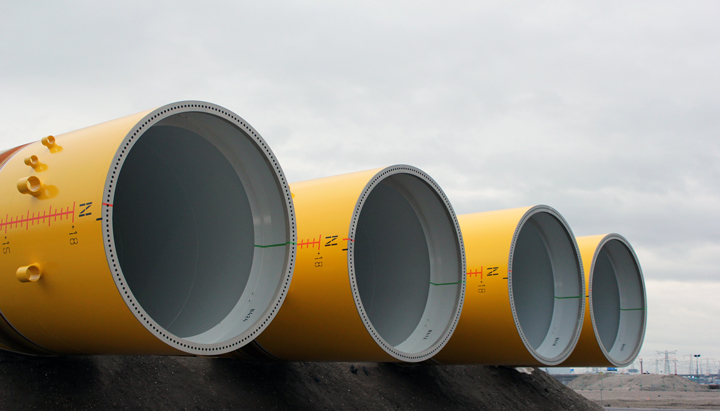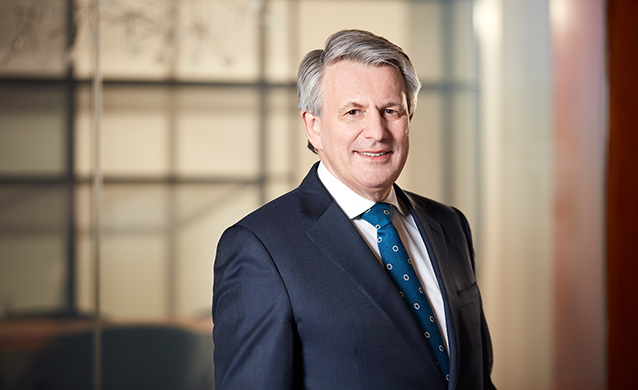Cleaner power
Lower-carbon electricity
In 2019, we stepped up our activities in generating and trading lower-carbon electricity, as well as providing it directly to customers.
These activities are part of our aim to make power a significant business for Shell – a business that, in the future, could sit alongside oil, gas and chemicals. This means being involved at almost every stage of the power system: from generating electricity, to buying and selling it, to storing it, to supplying it directly to homes and businesses.
Electricity from renewable sources, such as wind and solar, can be combined with the electricity produced from natural gas. Together, they can provide cleaner sources of power.
Read more about our lower-carbon electricity business and solutions at www.shell.com/energy-and-innovation/electricity.
In 2019, we supplied more than 900,000 customers in the UK with 100% renewable electricity. Through our Shell Energy Retail business (rebranded from First Utility, which we acquired in 2018), we supply renewable electricity as well as natural gas and smart home technology. In 2019, we also acquired Hudson Energy Supply UK Limited, which provides natural gas and renewable electricity to businesses. Our renewable electricity is certified by Renewable Energy Guarantees of Origin, which means that all the electricity customers buy is matched with the equivalent amount of units from 100% renewable sources.
In Australia, we acquired ERM Power, one of the country’s largest energy retailers for businesses and industry. ERM will become the platform for our integrated power business in Australia.
We also made acquisitions and investments in solar, wind, battery storage for solar-powered homes and renewable energy trading, as well as charging networks for electric vehicles (see Wind, Solar, Distributed and household energy and e-Mobility respectively).
Wind
We are expanding our operations in wind power to make more renewable power available to our customers. At the end of 2019, the Shell share of total installed capacity combined from onshore and offshore wind was 290 megawatts (MW) with 2,196 MW in development.
Visit www.shell.com/energy-and-innovation/new-energies/wind to find out more about our work in wind power.
We have interests in offshore wind projects with the potential to generate nearly 5 gigawatts of power once constructed (total installed capacity, with some projects still to receive a final investment decision).
Shell has four onshore wind projects in operation in the USA and one offshore project in operation in the Netherlands.
We also have interests in three wind projects under development – two in the USA, Atlantic Shores Offshore Wind joint venture (Shell interest 50%) and the Mayflower Wind Energy joint venture (Shell interest 50%); and one in the Netherlands, the Blauwwind Consortium (Shell interest 20%).
Construction of the Borssele III and IV offshore wind project by the Blauwwind Consortium began in 2019. The wind farm project is designed to have a total installed capacity of 731.5 MW, enough to power 825,000 Dutch homes. Shell has an agreement to buy and trade half the electricity produced from Borssele.
In 2019, the Mayflower Wind Energy joint venture was chosen by the state of Massachusetts to supply 804 MW of renewable energy to electricity customers.
In 2019, we acquired EOLFI, a French renewable energy developer specialising in floating wind power. Floating wind technology could open up more locations for offshore wind. They include areas further from shore and where greater water depths do not allow for traditional foundations.
We continue to invest in floating technology turbine technologies and take part in several joint industry initiatives to boost innovation in this area, as well as demonstration projects.
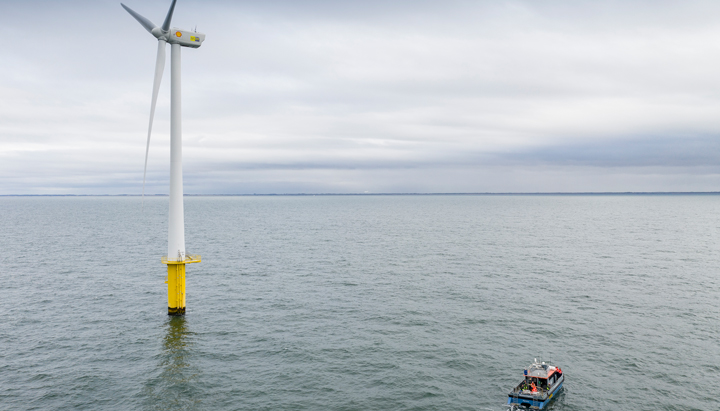
We now have interests in wind farms globally with the potential to generate more than 2 gigawatts of power.
Solar
We are expanding our solar power generation business by investing in the development and operation of long-term commercial and industrial solar projects, including at our own sites. At the end of 2019, our share of solar installed capacity was 414 MW and 442 MW in development.
Read more about our operations and investments in solar power at www.shell.com/energy-and-innovation/new-energies/solar.
In 2019, we acquired a 49% interest in Singapore-based Cleantech Solar, which owns and operates around 145 megawatts (MW) of installed capacity and has 178 MW of signed and in-development capacity for commercial and industrial customers in India and across South-East Asia.
We also acquired an interest of 49% in ESCO Pacific, one of Australia’s most successful solar development and asset management firms. The company has delivered nearly 500 MW of solar projects and has 350 MW under long-term management.
In 2018, we acquired a 43.83% interest in Silicon Ranch, a leading US developer, owner and operator of solar assets. In 2019, Silicon Ranch announced the launch of a programme that combines clean electricity generation with carbon sequestration and ecosystem restoration.
To help consumers generate, store and redistribute low-carbon electricity, we also bought sonnen, a leader in intelligent energy storage. Read more about sonnen in Distributed and household energy.
Solar at our sites
We are using more solar power at our own sites. This includes our offices, retail sites, distribution terminals, refineries and offshore installations (see Energy efficiency in our operations).
In 2019, we opened one of the largest on-site solar parks in the Netherlands at our Moerdijk chemical plant and built rooftop solar installations at seven lubricant plants worldwide.
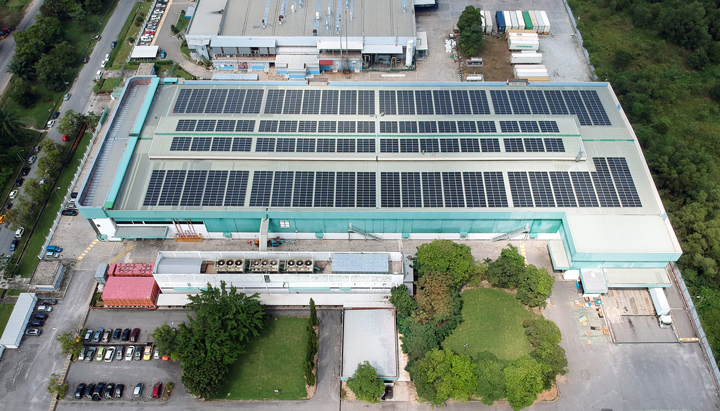
Cleantech Solar focuses its solar photovoltaic projects on commercial and industrial customers.
Distributed and household energy
The power market is more than just delivering electricity to companies and homes. Consumers, big and small, are for example starting to generate their own power through solar panels or wind turbines, store it for use later and redistribute it where it is needed most.
Visit www.shell.com/energy-and-innovation/electricity for more on our renewable energy solutions for homes and businesses.
We are delivering products and services that help meet this changing consumer demand. We bought sonnen, a German company that provides smart battery storage and innovative energy services, such as virtual power plants. Around 50,000 households and small businesses across Europe, North America and Australia use sonnen batteries.
Sonnen’s battery solutions are a safe way to ensure homes are powered with cleaner and more reliable electricity. Households with solar and sonnen equipment can store their surplus solar power during the day and use it at night or when there is a grid power outage. In Germany, if customers are short of electricity, they have the capacity to share surplus solar power of other sonnen users.
Sonnen also supplies battery storage systems for residential virtual power plants, for example, at the 600 solar-powered, all-electric apartments at the Soleil Lofts community in Utah, USA. The local electricity supplier controls the batteries and can use the community’s surplus solar energy to help manage supply and demand. This is the largest virtual power plant of its kind in the USA.
In 2019, we also acquired the UK power trading company, Limejump, which helps smaller renewable energy generators to get a better outcome by combining their individual assets into a larger virtual grid. This enables the renewable energy companies to sell clean power in real time to the national grid.
How sonnenCommunity works
Access to energy
Goal 7 of the UN sustainable development goals recognises the vital importance of “access to affordable, reliable, sustainable and modern energy for all” in eradicating poverty and protecting the planet. We are working to support this goal by providing more and cleaner energy.
Globally, around 860 million people lack access to electricity, according to the International Energy Agency, and hundreds of millions more are estimated to have an unreliable supply.
We want to help people gain access to the benefits of electricity and, in line with society’s expectations, from cleaner sources.
Read how we are helping people across the world gain access to a reliable supply of cleaner electricity at www.shell.com/energy-access.
Our ambition is to provide a reliable electricity supply to 100 million people, primarily in Africa and Asia, by 2030.
Investing in energy access
We are investing in companies that deliver innovative off-grid, or distributed, energy access solutions with the potential to be developed on a larger scale. These include solar mini-grids and solar home systems that can deliver the reliable, affordable electricity customers need.
In 2019, Shell New Energies acquired a minority interest in Orb Energy, which provides solar energy solutions in India and Africa, mainly serving small- and medium-sized enterprises such as factories, schools and hospitals. We announced our intention to make a minority investment in PowerGen, a company that develops, builds and operates mini-grids in Africa, as well as in d.light, which provides reliable and affordable solar lighting and power systems for households and small businesses in 70 countries.
Read more about the rest of our energy access investments at www.shell.com/energy-access.
Social programmes
Alongside, but separate from, our commercial investments, we also support social programmes that benefit communities where we work. Through these voluntary initiatives, we work with partner organisations to provide the means for individuals and communities to access reliable electricity to improve lives and generate greater economic opportunity.
We invest in a range of programmes in selected communities located near our operations to provide access to energy to local people and strengthen local economies.
Read more about our access to energy social programmes at www.shell.com/sustainability/communities/access-to-energy and how we tackle energy poverty with our energy access business at www.shell.com/energy-access.
In 2019, Shell Pakistan Limited worked with the National Rural Support Programme on an initiative to help people in Basti Bullah Baloch, a small village in eastern Pakistan, use energy and resources more productively and sustainably.
Farmers in the village grow cotton, wheat and sugar cane. Irrigation is essential to help crops grow.
The initiative helped replace diesel well pumps with a new solar-powered tube well, which more than doubled the water output and significantly reduced the time needed to irrigate fields. This saved villagers $22 an acre in fuel for each irrigation cycle. A new solar-powered flour mill was also installed, meaning people no longer needed to travel around 8 kilometres to grind their wheat into flour.
Many families were also able to switch to using cleaner stoves to cook meals. Previously, they relied on solid fuels for cooking, which filled their homes with harmful fumes and smoke. The cleaner stoves were developed by a winner of Shell LiveWIRE, our flagship youth entrepreneurship programme.
Further training and a community-owned fund will help the village sustain these improvements successfully over the long term.
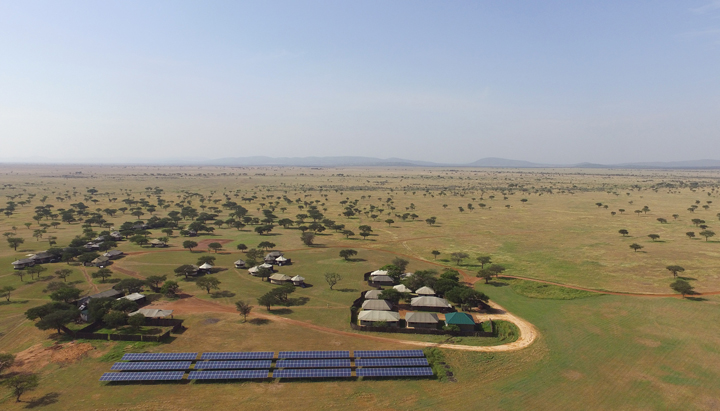
In 2019, Shell invested in solar debt financing firm Sunfunder that supports the growth of commercial businesses to improve energy access in East Africa, West Africa and other developing regions.
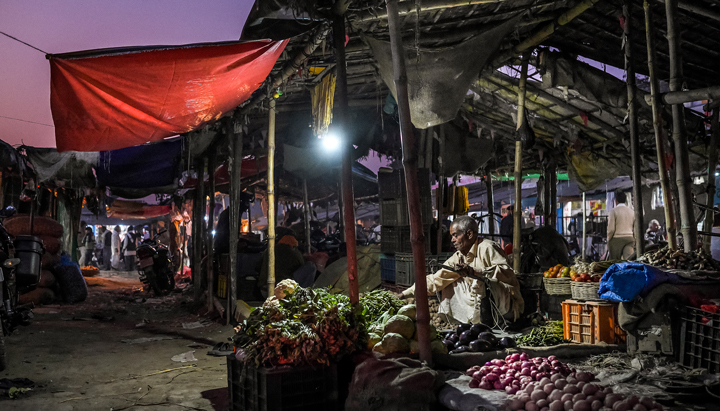
We are working in India with Husk Power Systems, a mini-grid company, using a hybrid solar photovoltaic and biomass gasification system with battery storage to provide reliable and affordable electricity 24 hours a day to customers on a pay-as-you-go basis.
 Climate change
Climate change
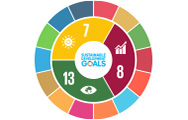 Sustainable development goals
Sustainable development goals
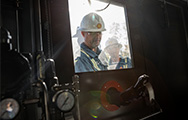 Safety
Safety
 About our data
About our data
